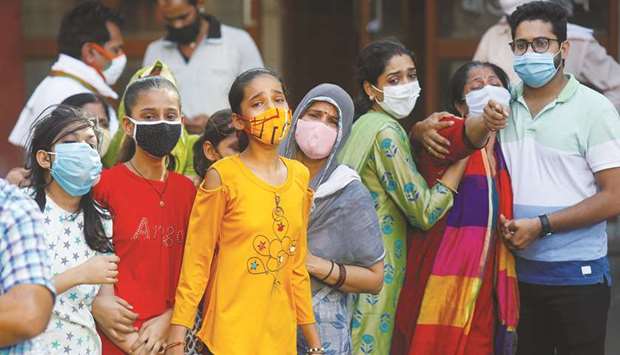India yesterday reported that novel coronavirus infections had topped 6mn, nowhere near the number required for herd immunity in country of 1.3bn people, and raising anxiety going into the peak period for religious festivals.
India added a million cases in just 11 days, according to a tally of government data, and it has the second-highest number of infections, behind the United States which crossed 7mn last week.
India’s festival season, which climaxes in October and November with the popular celebrations of Dussehra and Diwali, poses additional challenges, as officials try to dampen the usual large public celebrations and cross-country travel.
Typically the festival season brings a big increase in consumer spending, and the more sombre atmosphere this year will further dampen an economy that contracted by almost a quarter in the three months to June – the worst figure on record.
The Gujarat government said it will not hold an event to mark the nine-day Navratri festival due to begin on October 17.
“Navratri celebrations means business for garba (dance) classes, venues, decorators, food and water suppliers, orchestras, security agencies, sound system suppliers, dress and artificial jewellery sellers,” Samir Shah, director of Gujarat-based Archie Events said.
“The economic impact is huge for everyone involved.”
Major cities in the state like Ahmedabad, Surat and Vadodara have dozens of large private events every year, that organisers say are almost certain to be cancelled.
In normal times, thousands of people would attend these gatherings every day during the festival, and Shah said that one major dance event would give temporary employment for at least 250 to 300 people.
Health Ministry data yesterday showed there were 82,170 new infections in the last 24 hours.
The daily death toll was 1,039, bringing the total number of victims to 95,542, the ministry said.
While daily cases are down slightly from a peak hit earlier this month, the government led by Prime Minister Narendra Modi has urged people to remain on guard, with the country’s often-fragile healthcare system struggling to handle the rising number of cases.
“We are far from having achieved any kind of herd immunity, which necessitates that all of us should continue following Covid-appropriate behaviour,” federal Health Minister Harsh Vardhan told his social media followers in a broadcast on Sunday.
The virus initially hit major metropolises including financial hub Mumbai and capital New Delhi, but has since spread to regional and rural areas where healthcare systems are even more fragile and patchy.
“In several of the pockets where the transmission is active, the infection has gone into the community,” former national health secretary Sujatha Rao said.
“It is difficult to control transmission in such situations and a dramatic turnaround can perhaps be possible only through a rigorous implementation of a lockdown and preventive measures like mask wearing.”
The government is unlikely to reimpose major restrictions after a lockdown in March battered the economy and wrecked the livelihoods of millions of people, particularly the poor.
Some schools have now reopened, and trains, metros, domestic flights, markets and restaurants have been allowed to operate with some restrictions.
The Taj Mahal also opened again for tourists this month.
Anand Krishnan, a community medicine professor at the All India Institute of Medical Sciences (AIIMS) in Delhi, said authorities should focus on treating people who contract the virus.
“The only thing that we can do is take care of people who are ill – identify them faster and treat them better. And follow the social-distancing norms,” he said.
“Beyond that, I don’t think there is anything specific that can be done.”
Some people in Delhi said that while they remained cautious, their worries about the pandemic had lessened since the start of the year.
“I’m out of the house all day because of my work. I don’t step out of the house for anything else,” said 23-year-old medical store worker Umang Chutani.
“The future is uncertain but one can only be cautious and follow all safety protocols.”
Himanshu Kainthola, 61, who recovered from the virus last month after testing positive with two other relatives, said his family’s fears “have reduced substantially”.

Relatives mourn the death of a man due to the coronavirus disease, at a crematorium in New Delhi, yesterday.
